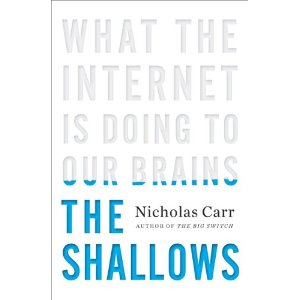
In addition to starting beginner piano lessons, I began yoga earlier this year.
I’m still very much a yoga newbie, not always sure if my hands and feet are in the right place to go from plank to downward facing dog, but I’m trying.
A few weeks ago, our instructor asked us to get into a relatively easy stretching pose and hold it. For what felt like an eternity.
She said she wanted us to resist the urge to readjust or move into a different pose and just be. Then she coached us on focusing only on our breathing, clearing out other thoughts and being still.
It struck me how unusual that state of mind is for me. I think I was a natural multitasker anyway, but throw in cell phones and texting, the Internet and social media, and I spend most of my day either taking in information or pushing it out.
After class, when I could return to letting my brain race all around, I remembered a talk I really enjoyed at South by Southwest this year.
 Nicholas Carr, author of “The Shallows: What the Internet Is Doing to Our Brains,” spoke about how the constant stream of available information online is very appealing to our desire for short-term payoff. Like a rat with cheese, we get that reward and get conditioned to seek it again.
Nicholas Carr, author of “The Shallows: What the Internet Is Doing to Our Brains,” spoke about how the constant stream of available information online is very appealing to our desire for short-term payoff. Like a rat with cheese, we get that reward and get conditioned to seek it again.
Austin360’s Omar L. Gallaga covered Carr’s talk at SXSW and wrote:
The Internet is changing our relationship with information and how our neurons connect. Without a break from being online, we don’t have a protected space for reflection, which is where we recharge and find balance. “There needs to be time for efficient data collection and for inefficient contemplation. The development of a well-rounded mind requires both.”
“True enlightenment comes only through quietness.”
I don’t think it’s a coincidence that many people say they get their best ideas in the shower or as they’re falling asleep. When you turn off the flow of new input coming at you, your brain can go to work analyzing and connecting ideas without distraction.
I’ve started seeing friends posting New York Times articles on Facebook with the theme “Your brain on computers.” (There’s a certain irony, of course, since Facebook is one of the great distractions of our age.)
One recent piece, headlined “Hooked on Gadgets, and Paying a Mental Price,” includes this:
… These play to a primitive impulse to respond to immediate opportunities and threats. The stimulation provokes excitement — a dopamine squirt — that researchers say can be addictive. In its absence, people feel bored.
While many people say multitasking makes them more productive, research shows otherwise. Heavy multitaskers actually have more trouble focusing and shutting out irrelevant information, scientists say, and they experience more stress.
And scientists are discovering that even after the multitasking ends, fractured thinking and lack of focus persist. In other words, this is also your brain off computers.
“The technology is rewiring our brains,” said Nora Volkow, director of the National Institute of Drug Abuse and one of the world’s leading brain scientists. She and other researchers compare the lure of digital stimulation less to that of drugs and alcohol than to food and sex, which are essential but counterproductive in excess.
Which all brings me back to yoga. If I spend most of my waking time staring at a computer or clicking away on my BlackBerry, maybe I need to intentionally work on the antidote — a little time when I focus on trying to balance on one foot and stretching a little bit farther.
Want to give it a try? Here’s a snippet of some beginner yoga. Namaste.
[youtube=http://www.youtube.com/watch?v=8SSEZmXNXGY]


3 Comments
Anjeanette
Yoga is great for concentration. Down dog is a staple of yoga. It’s important especially for newbies to utilize key positioning skills. I found that Leeann Carey has a great free yoga video on this very thing. Your readers might want to check it out: http://planetyoga.com/yoga-blogs/index.php/free-yoga-video-key-positioning-skills-kps-push-and-reach/
Leave a reply